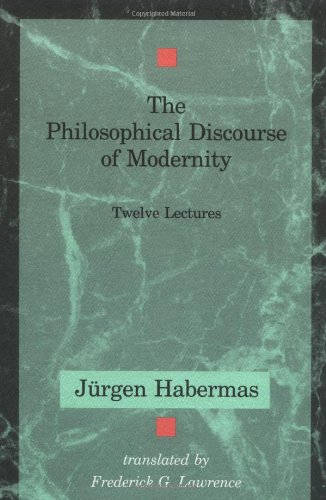The Philosophical Discourse of Modernity book
Par fryar theresa le mardi, juillet 26 2016, 03:47 - Lien permanent
The Philosophical Discourse of Modernity. Frederick Lawrence, Jurgen Habermas, Thomas McCarthy

The.Philosophical.Discourse.of.Modernity.pdf
ISBN: 0745608303,9780745608303 | 456 pages | 12 Mb

The Philosophical Discourse of Modernity Frederick Lawrence, Jurgen Habermas, Thomas McCarthy
Publisher: Polity Press
Exploring the Modern: Patterns of Western Culture and Civilisation, Blackwell, Oxford, 1998. Thus, on this line of reasoning, in the early twentieth century German philosopher Martin Heidegger theorized modernity as a huge system of “enframing” that reduced things to mere objects and functions available for human use. The book is The Philosophical Discourse of Modernity . The roots of modernity get at the philosophical discourses of enlightenment. Nihilism in critiquing disciplinary power or offering alternative models based in the care of the self, for instance, he is engaging in “crypto-normativity” (Habermas' term in The Philosophical Discourse of Modernity, 1992). �Jürgen Habermas, The Philosophical Discourse of Modernity (1985; trans. Lawrence (Cambridge, Mass: MIT Press, 1987). Moments of fascinated shock, when those categories fall apart that guarantee in everyday life the confident interaction of the subject with himself and with the world (Habermas, The Philosophical Discourse of Modernity, pp. This perspective is precisely part of a discourse of modernity that is established in the 19th century in the wake of the Industrial Revolution and becomes dominant in the USA after the Scopes trial in the 1920s. An attempt at a reevaluation of Neo-Kantianism, on the contrary, is to be found in Jiirgen Habermas, The Philosophical Discourse of Modernity, trans. Modernism as a Philosophical Problem, Oxford, 1991. Scientific reasoning does not sit easily with the presuppositions of any religion, and the work of Enlightenment philosophers made the belief in God appear irrational…It is easy to imagine Mohammed Atta, at Hamburg . Jürgen Habermas, The Philosophical Discourse of Modernity. Of late, numerous dialogues have been made concern with the width of currents of modernity. Heidegger has no objection to such a rational framework if it is understood clearly to be a technical means (it is perhaps this distinction that Habermas occults in 'Philosophical Discourse of Modernity'). Jon Cogburn said in reply to bzfgt I'm sorry bzfgt. Discourse is an activity designed in order to bring ideas down from the proverbial heavens and affect the course of our lives, our destinies, and our polis. Freed's definition of that discourse runs something like this. Its impossible projects – is what makes The Man Without Qualities not so much a modernist novel as an 'intervention in the philosophical discourse of modernity'. (truth, power, normality, normativity).